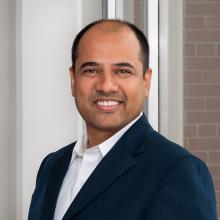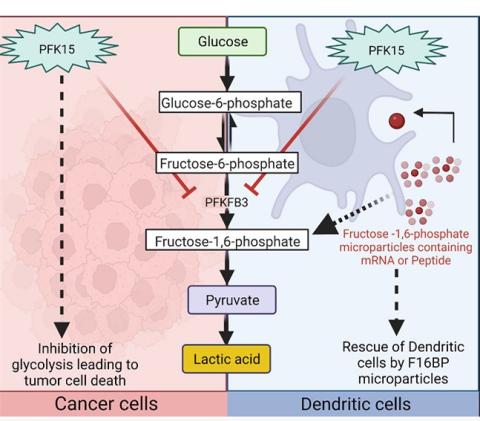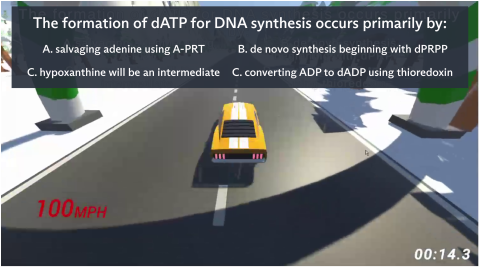"When you learn, teach. When you get, give."
- Maya Angelou
Every Monday morning, Abhinav Acharya emails a motivational quote to team members in his lab and other colleagues.
“I eagerly anticipate this dose of wise and meaningful advice, which sets a positive tone for the start of each week,” says Joslyn Mangal, who earned her doctorate from Arizona State University in 2022 under the mentorship of Acharya and now works as a principal investigator at ImmunoMetabolix, one of his start-up companies.
Acharya’s positivity, along with his passion for science and commitment to collaboration, have contributed to his rise in the burgeoning field of immunoengineering. Existing at the intersection of immunology and engineering, the discipline strives to create new technologies to better understand and modulate the immune system.
Last fall, Acharya joined Case Western Reserve University as assistant professor in biomedical engineering and a member of the Case Imaging Program in the Case Comprehensive Cancer Center.
“I want to grow the immunoengineering area, and there’s no better place than Case to do it,” says Acharya. “The university offers unique access to world-class engineers, experts in the School of Medicine and clinical collaborators in leading healthcare systems, such as Cleveland Clinic and University Hospitals.”
Interest in Immunometabolism
As an undergraduate student in metallurgical engineering at the National Institute of Technology in India, Acharya became intrigued by how materials implanted in the body – hip and knee replacements, dental implants and so on – interacted with different biological systems.
“One of the first things that biomaterials see is the immune system, which touches every other system in the human body. That really attracted me to the field of immunoengineering,” says Acharya. “I can collaborate with folks who work not just in immunology, but in other systems like the endocrine and renal system that interact with the immune system. We work together to ask and answer really difficult questions.”
Acharya earned a master’s degree and PhD in materials science and engineering from the University of Florida, then completed postdoctoral fellowships at the Georgia Institute of Technology and the University of California, Berkeley. After serving as a postdoctoral researcher at the University of Pittsburgh, he was an assistant professor in chemical engineering at Arizona State University before joining Case Western Reserve University. In each of these stops, Acharya expanded his network of collaborators and the scope of his research.
“Abhi’s lab comes up with out-of-the-box ideas that are practical and have great translational value,” says Sahil Inamdar, who was the first PhD student to graduate from Abhi’s lab. “In the last five years, he has created a niche in immunoengineering at the cross section of biomaterials, metabolism, immune modulation and vaccine development for various diseases.”
A Three-Pronged Approach
Researchers in Acharya’s lab at Case Western Reserve University are focused on three main areas – designing biomaterials, engineering the immune system’s metabolism and developing clinical applications.
“We utilize biomaterials to modify the metabolism of immune cells and see if it affects the disease outcome with the ultimate goal of generating translatable products to treat chronic inflammatory conditions, autoimmune diseases, cancer and other conditions,” says Acharya.
The team has designed several polymers as vaccine components that can modify metabolism. These include a vaccine for rheumatoid arthritis, which has been patented and licensed.
“We are also developing vaccines for traumatic brain injury (TBI) that soldiers, football players and other at-risk people can get before they have trauma and reduce chronic inflammation-associated symptoms after TBI,” says Acharya.
After arriving at Case, Acharya initiated a microelectrode implant project with Jeff Capadona, professor in the Department of Biomedical Engineering and the School of Medicine. Capadona’s lab develops advanced, bio-inspired materials for brain interfaces to facilitate neural recordings. One of the impediments to widespread adoption of neuroprosthetic devices is the unreliability of chronic neural recordings.
“The immune system is constantly infiltrating the microelectrode implant site and affecting recordings,” says Acharya. “We are trying to educate the immune system to develop receptors that recognize the microelectrode – a completely foreign material – as part of your own body so you don’t start attacking it.” That would extend the life of the implanted microelectrodes.
Clinical and Educational Impact
The lab’s projects blanket a vast swath of conditions, including traumatic brain injury, multiple sclerosis, rheumatoid arthritis, lymphoma and melanoma, with the ultimate goal of helping people.
“From the start I have made it a priority for my lab that when we address a problem and develop a formulation, we always keep in mind the final clinical impact,” says Acharya. That focus on translational science has contributed to the spinoff of technologies and launch of two startup companies.
ImmunoMetabolix is dedicated to upscaling and commercializing metabolite-polymer technologies for treating immune-mediated diseases that could stand alone or work in tandem with existing immunotherapies, such as checkpoint inhibitors, vaccines and chimeric antigen receptor (CAR) therapy. VaderBio is focused on developing interleukin-based therapies for treatment of autoimmune diseases, such as rheumatoid arthritis and multiple sclerosis.
As the Acharya lab develops more technologies – and graduates more students – its influence on the immunoengineering field will continue to grow. After earning his PhD in 2022, Inamdar joined Khloris Biosciences as a pre-clinical vaccine development specialist helping the company advance the use of induced pluripotent stem cells (iPSCs) as potential vaccines for cancer treatment.
“I am in industry today because of Abhi’s mentorship and guidance,” says Inamdar. “He has a great entrepreneurial acumen, which has trickled down to all his students.” That includes Mangal, whose responsibilities at ImmunoMetabolix include writing and editing grants and collaborating with researchers to publish manuscripts.
“Abhi fosters a passion for research by empowering students to formulate their own ideas,” she says. “This approach ensures that students are not only passionate and invested in their work, but also develop skills that extend beyond their graduate careers.”
To reach even more students, Acharya created an undergraduate course on immunoengineering at Arizona State University. Launched during the COVID-19 pandemic, it garnered a lot of interest. He hopes to introduce the course at Case Western Reserve University when he begins teaching in the fall.
Focus on Growing the Field
Acharya can boast many individual accomplishments, including 17 patents and more than 55 journal publications. However, for him the goal is to grow the field and expand the horizon of immunoengineering.
“There are people working in neurology, immunology and biomaterials – all on the fringes of immunoengineering,” he says. “If we propagate the field, we can bring all those people into the fold and grow it exponentially.






